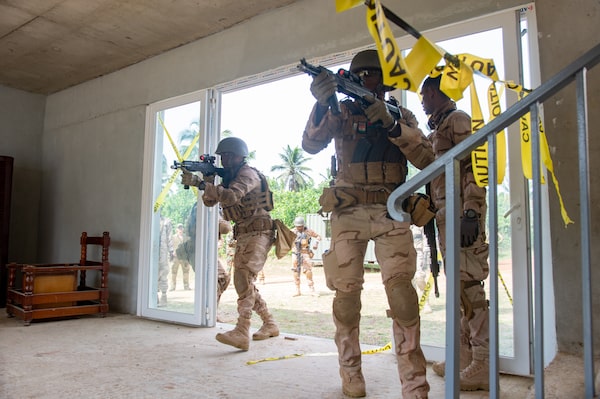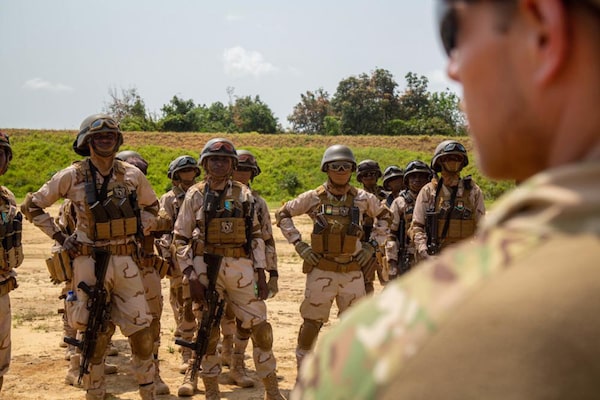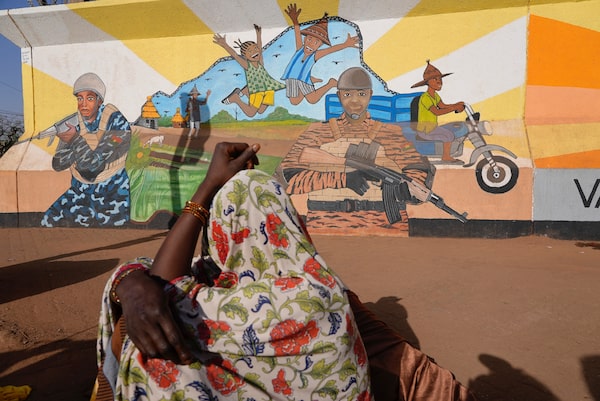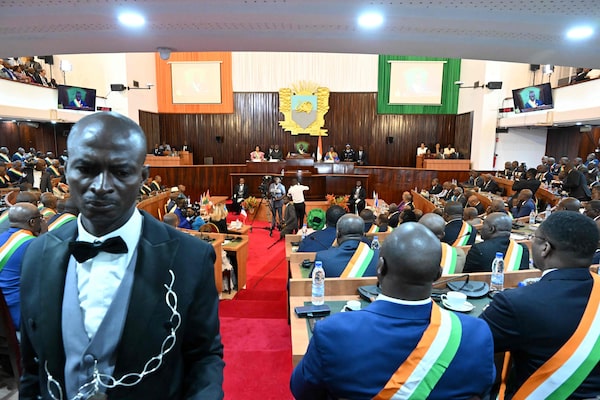
Soldiers from Niger storm into a hotel building near Jacqueville, Ivory Coast, mentored by a member of Canada's Special Operations Forces who is visible at rear left.Cheick Sylla/The Globe and Mail
Under the watchful eye of a Canadian soldier, heavily armed troops from Niger storm into a three-storey hotel and launch a room-by-room close-quarters operation to clear the terrorists who, in this drill, have seized the building.
At a 400-metre shooting range nearby, another Canadian soldier briefs forces from Niger as they prepare to aim their sniper scopes at a series of targets. A third Canadian is monitoring a unit’s battlefield emergency-aid procedures.
The counterterrorism exercise is being conducted under the palm trees of a lush training site near the Gulf of Guinea, but the real target is much farther north, in the deserts of the Sahel region, in countries such as Mali and Burkina Faso, where Islamist militants have killed thousands of people and forced millions to flee from their homes.
The exercise, known as Flintlock and sponsored each year by the U.S. military, is part of a larger Western anti-terrorism campaign that has failed to halt the rapid expansion of the radical militias in West Africa over the past decade.
This year the training resumed with a new urgency, with everyone aware of the signs that the jihadists are moving ominously southward toward the relatively stable coastal countries on the Gulf of Guinea.
Two of those coastal states, Ghana and Ivory Coast, were the hosts this year of Flintlock, in which 29 countries and about 1,300 soldiers participated in early March.
Much of the training this year was near the Ivory Coast town of Jacqueville, on the sprawling grounds of the International Counter-Terrorism Academy, a new US$65-million African training facility that France helped to finance.
Among the trainers and mentors at Flintlock were about 20 members of Canada’s special operations forces. It was the 12th year of Canadian involvement in the counterterrorism exercise.
The Canadians are aware of the reported rise in jihadist attacks here. The threat level in the coastal states seems to be increasing, according to a special operations officer named Darryl, a senior Canadian at Flintlock, whom The Globe and Mail is identifying by first name only because Canada’s military rules forbid special operations forces from being publicly identified by name or rank.
The Canadians are trying to provide the tools the West African soldiers need to secure their communities and countries, he said.

Soldiers from Niger are briefed by a Canadian special operations officer on procedures at a target range near Jacqueville. The training exercise was held at the International Counter-Terrorism Academy, built to prepare African militaries for terrorism threats in their home countries.Cpl. Clara Soria-Hernandez/U.S. Army
Independent analysts have questioned the effectiveness of the training exercises after years of worsening conflict. But for the Pentagon and its allies, this is a crucial campaign. Extremist groups born in the Middle East have been transplanted to Africa, where they have flourished in their new territory, according to a recent assessment by General Michael Langley, commander of the U.S. Africa Command.
Islamist radical groups are “wreaking havoc” in the Sahel, especially in rural Mali and Burkina Faso, and are now projecting themselves into the Gulf of Guinea coastal states, Gen. Langley told the U.S. House of Representatives armed services committee last month.
“Terrorist attacks in the Sahel region accounted for over a third of the world’s terrorism deaths in 2021 – up from just 1 per cent in 2007,” he said in his testimony.
The violence has continued to escalate over the past year. Nearly 7,900 people were killed in more than 2,700 violent attacks by Islamist extremists in the Sahel region last year – primarily in Mali, Burkina Faso and Niger – according to data compiled by the Armed Conflict Location & Event Data Project, a U.S.-based research group. The number of attacks was 36 per cent higher than in the previous year, and the number of deaths rose by 63 per cent, it said.
In Burkina Faso alone, the violence has forced nearly two million people to abandon their homes. More than 6,000 schools – almost a quarter of all schools in the country – have had to shut their doors because of the conflict.
A report by UNICEF found that the number of children killed in the conflict had tripled in the first nine months of last year, compared with the same period of the previous year. And the jihadists now control an estimated 40 per cent of the country.

A woman in Ouagadougou, capital of Burkina Faso, looks at a mural of national security forces protecting happy villagers. Burkina Faso and neighbouring Mali and Niger are bearing the brunt of the recent wave of violence.The Associated Press
Special forces from Niger, mentored by a Canadian special operations officer near Jacqueville in Ivory Coast, are preparing for terrorist attacks of the kind that have escalated across West Africa in the past several years, especially in the Sahel region but also in coastal countries such as Ivory Coast, Benin and Togo.Cheick Sylla/The Globe and Mail
This explains a simulated Sahelian village that has been created as a target for military assault drills at the counterterrorism site in Ivory Coast, where its mud walls and desert architecture are an odd sight in the verdant jungle. African troops stormed the village during the Flintlock exercise in early March.
But while the Sahel remains the epicentre, the extremist violence is starting to spill across borders to coastal states, including Ivory Coast, Togo and Benin, where dozens of attacks have been reported. The jihadists cross borders to seek funding and ambush soldiers. At least 18 members of Ivory Coast’s security forces have been killed in jihadist attacks over the past three years.
“These attacks need to be taken seriously,” said Ella Jeannine Abatan, senior researcher for the West African region at the Institute for Security Studies.
“They show the capacity of violent extremists to cross borders into coastal states, taking advantage of porous borders and other vulnerabilities.”
The extremists have exploited the weak governance in the border regions and the existence of criminal networks and traffickers that cross borders, Ms. Abatan told The Globe.
“Coastal states need to understand the local vulnerabilities. If they wait for the attacks to increase, it could be too late.”
U.S. and West African soldiers in Ghana conducted the first maritime drills in the history of the Flintlock training exercise.
Forces from Niger train on the beach in Sogakope, Ghana, as part of Operation Flintlock.Francis Kokoroko/Reuters
The coastal states, including Ghana, Ivory Coast, Togo and Benin, have responded by joining with the Sahel countries in a security alliance – the Accra Initiative – intended to boost co-operation in intelligence gathering and cross-border military operations against the radical militias. Late last year, they announced plans to create a multinational task force of 10,000 soldiers, mostly stationed in northern Ghana, to respond swiftly to extremist attacks, although its details and powers are still undefined. Ghana also disclosed in early March that it is buying more than 100 armoured vehicles to bolster its border security.
The United States announced in late March that it will provide US$100-million over the next decade to boost security, governance and development in the coastal states on the Gulf of Guinea. Both the United States and Canada have emphasized that their response to the extremist violence is a multi-dimensional strategy, with development assistance among the key elements. But there is no doubt that military training remains a top priority for them and their allies. “The questions before us are clear: how to fight effectively against terrorist groups that are more mobile than ever,” Jean-Yves Le Drain, the French foreign minister at the time, said at the International Counter-Terrorism Academy’s official opening in 2021.
Since then, French troops have been forced to withdraw from Mali and Burkina Faso, where military juntas have seized power in coups. Mali’s military regime has opted to recruit Russian mercenaries from the Wagner Group to replace the French troops, but the insurgencies have only grown deadlier. In both countries, the radical militias have moved southward, closer to the capital cities.

Ivorian lawmakers gather for a legislature ceremony in Abidjan on April 3.ISSOUF SANOGO/AFP via Getty Images
Ivory Coast, which shares lengthy borders with both Mali and Burkina Faso, is increasingly feeling the impact of the chaos to the north. Thousands of refugees have fled to the country from the Sahel region. The insurgents have largely been pushed back from Ivory Coast, but they remain nearby, a constant threat, analysts say.
The Ivory Coast government has pumped money into border security, boosting security-force patrols and buying new military equipment. But it has also boosted its spending on social development and youth programs in the north, in an effort to discourage local recruitment by the jihadists.
“The risk is increasing,” said a senior official in Ivory Coast’s government, whom The Globe is not naming because he is not authorized to speak to the media. “It’s a big threat to us. If the two capital cities fall, it would be a big concern. That’s why we are putting so many resources into border security.”
There has been “almost no collaboration” between Ivory Coast and the military junta in Mali since the latest coup in 2021, the official said. “Nobody can understand the logic of the Mali regime.”
He described the Flintlock military exercise as extremely important. But some analysts are less convinced. They argue that the U.S.-sponsored counterterrorism drills have limitations that haven’t been properly assessed.
“I’m really skeptical about this kind of exercise,” said William Assanvo, a senior researcher in Ivory Coast for the Institute for Security Studies.
“Flintlock has been organized regularly for many years, and it hasn’t prevented the situation from deteriorating – first in Mali and then Burkina Faso, and now targeting the coastal states. It’s good to strengthen the capacity of the troops and to teach them some techniques, but its effectiveness is at the tactical level. To win this battle is more at the strategic level: whether the armed forces are well equipped, whether the strategy is coherent and whether the political response is right.”
And then there’s another awkward problem. Several of Flintlock’s graduates have gone on to lead military coups in their home countries – raising some embarrassing questions about whether Flintlock inadvertently helped the enemies of democracy.
At the recent committee hearing, U.S. Rep. Matt Gaetz repeatedly asked about the U.S. training and its link to coup leaders. Gen. Langley, in response, insisted that the training emphasizes the “core values” of “respect for civilian-led government.” Less than 1 per cent of African graduates of U.S. training have later become involved in coups, he said. But since the training has involved tens of thousands of African soldiers over the past two decades, even 1 per cent could imply that hundreds of its beneficiaries have been involved in the overthrow of governments.
Canadian soldiers near Jacqueville say their training of African forces at Flintlock emphasizes the international laws of armed conflict, such as the Geneva Conventions.Cheick Sylla/The Globe and Mail
At the training site in Jacqueville this year, Canadian and U.S. officers described how the classroom training at Flintlock includes components on human rights, democracy, the Geneva Conventions, the laws of armed conflict, and respecting the rights of civilians and detainees. The Canadian trainers make sure to incorporate all of the values of the Canadian Armed Forces, and they make clear that adhering to those values is their expectation for the trainees, Darryl said.
Partly because of U.S. policy restrictions on engaging with regimes that overthrow democracies, the military junta in Mali did not send any troops to Flintlock this year.
Yet there is a backlash against these rules, too. The restrictions can sometimes give military regimes an incentive to do deals with Russian mercenaries as an alternative to Western forces, according to the Pentagon.
“Although well intended, U.S. coup restrictions can inadvertently incentivize the most at-risk African countries to dig themselves deeper into the mire of militancy and corruption,” Gen. Langley told a Senate committee on March 16.
The U.S. ambivalence on the democracy issue was evident at Flintlock this year. When the African soldiers arrived for the training drills, Mali’s absence was conspicuous. But soldiers did arrive from another military-ruled country: Burkina Faso.



 Geoffrey York
Geoffrey York